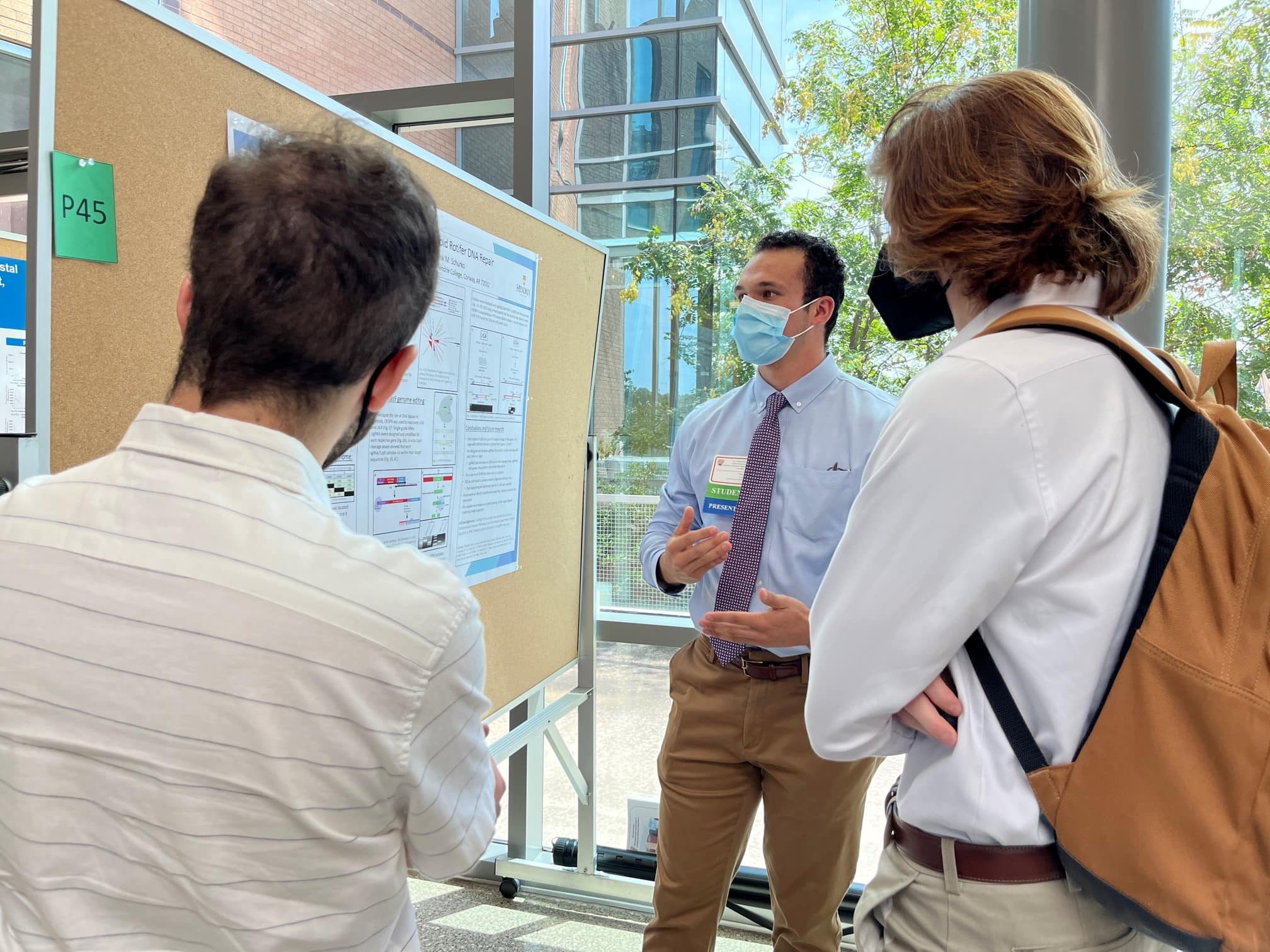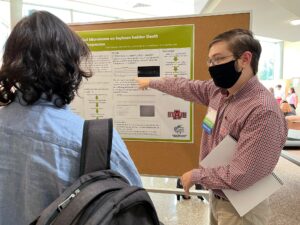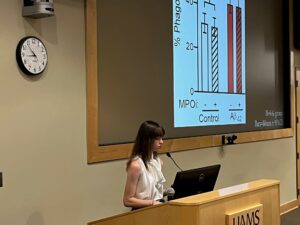Annual Arkansas Summer Undergraduate Research Symposium Returns to UAMS
| Education in action was the theme of the ninth annual Arkansas Undergraduate Summer Research Symposium at the University of Arkansas for Medical Sciences (UAMS).
Nearly 100 undergraduate students presented their work on July 27, gathering with faculty mentors from institutions across the state and nation for the daylong summer symposium. The annual event had been on hiatus for the past two years because of COVID-19 precautions.
“We’ve come back big for this symposium,” said Grover P. Miller, Ph.D., professor in the College of Medicine Department of Biochemistry and Molecular Biology. “Despite the pandemic, we were able to put together a very successful symposium that rivals what we’d achieved earlier. It’s exciting times.”
The students, representing 27 colleges and universities from 10 states, are participating in 23 different summer research programs supported by private, public, state and federal funds. Others attending included undergraduate researchers and faculty members from UAMS as well as other institutions across the state.
The symposium, held in the I. Dodd Wilson Education Building, featured research on a broad range of biomedical-related topics and celebrated achievements by undergraduates pursuing research at colleges and universities across the state and beyond. The event provided a critical opportunity for gaining feedback, learning new ideas, creating collaborations and recruiting students for UAMS’ programs.
“In the summer, there are a lot of great programs that happen around the state and the students get good input from their mentors and sponsors, but they get the most feedback from among their peers,” Miller said. “It’s important for you to talk to other people and learn as you go because what you are all doing now with the research is not taught in class, and the symposium provides an opportunity to share it with other people.”
The students presented 85 posters, and 12 of them gave short oral presentations during the symposium, which was hosted by the UAMS Graduate School, Department of Biochemistry and Molecular Biology and the IDeA Networks of Biomedical Research Excellence (INBRE) Program.
Daniel Jackson, who will be a senior studying biotechnology at Arkansas State University, was grateful to attend to share a poster of the project he’s been working on with his lab mate Nathan Williams, “Effect of Soil Microbiome on Soybean Sudden Death Syndrome Progression.”
The study looked at the 10% loss of the soybean crop due to the syndrome, caused by a specific fungal infection that rots roots, scorches leaves and kills the crop. The team’s research aims to use genomic approaches to measure the activity of the soil-borne microbes in both the presence and absence of the syndrome in both susceptible and tolerant plants.
Jackson worked with Asela Wijeratne, Ph.D., assistant professor of bioinformatics, and Edward Brown, Ph.D., assistant professor of agronomy at Arkansas State University with support from a Kays Foundation grant and the Arkansas State University Biosciences Institute.
Jackson’s team began the study in the summer and will continue the research through the fall because the life cycle of a soybean plant extends longer than eight weeks. They worked on the wet lab side in the summer and will focus on the informatics or computer-related portion of the study in the fall.
“I’ve really enjoyed getting to do some hands-on research in the lab, and this field is a really cool emerging area of study and it has far-reaching consequences, especially in an agricultural state like Arkansas,” Jackson said.
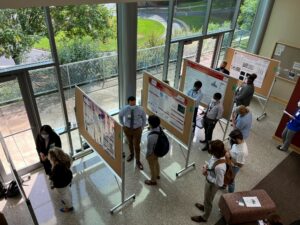
Morning and afternoon poster sessions were held in the lobby of the I. Dodd Wilson Education Building.
He added that the experience of taking part in the study and making his presentation at the symposium at UAMS will help him academically and professionally.
“It’s helping me to develop my lab skills and also in other areas such as communicating and sharing with others through public speaking. It’s so much more than just sitting in a classroom.”
Morganne Browning, who will be a junior majoring in biomedical studies at Arkansas Tech University in Russellville, presented a poster on the project, “3D Printed Protein Bar Targeting the Female Athlete Triad.”
She worked on her project this summer at the University of Arkansas in Fayetteville with Jamie I. Baum, Ph.D., associate professor of nutrition and director of the Center for Human Nutrition in the Dale Bumpers College of Agricultural, Food and Life Sciences through the IDeA Network of Biomedical Research Excellence.
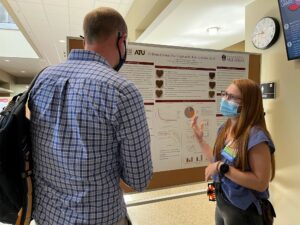
Morganne Browning of Arkansas Tech University discusses the summer project she worked on the the University of Arkansas at Fayetteville.Linda Haymes
Browning’s research looks at 3D-printed food and whether it can be used to provide individualized nutrition. The goal of her study was to demonstrate how 3D-printed food could combat the female athlete triad which is the relationship between low energy availability, low bone mineral density and menstrual dysfunctions. Complications of the female athlete triad can predispose young athletes to bone injuries and osteoporosis.
A basic recipe was created for an after-work out snack with a variety of protein powders available to be added to meet the specific nutritional needs and preferences of individual female athletes. Further studies hope to incorporate customized dosages of minerals and vitamins into the foundational recipe to further meet individual nutritional needs.
Browning’s study created bars made of protein from cricket, rice, whey, almond, pea and egg white sources. Browning’s study found that individualized nutrition and visually appealing shapes have the potential to encourage fueling with solid substance food to raise energy levels and possibly reverse menstrual dysfunction and low bone mineral density.
Browning said she learned a lot about methodology through her work on her research project.
“We discovered that the egg-white protein wasn’t as stable as the rest of the recipes and was more likely to fall apart,” she said. “There is also a large number of people who are still skeptical about foods that are 3-D printed, believing that they are unhealthy and more processed,” Browning said.

Grover P. Miller, Ph.D., professor in the Biochemistry and Molecular Biology Department in the UAMS College of Medicine welcomes students to the symposium.Linda Haymes
The symposium gave the students an opportunity to broaden and deepen their research experiences beyond the time at the bench over the summer, sharing their stories with each other and with a wide variety of faculty in different areas of research from several institutions. Keynote speaker Eric Enemark, Ph.D., associate professor in the College of Medicine Department of Biochemistry and Molecular Biology, underscored this by sharing how his own summer undergraduate research experience led him to realize that his calling was in research.
